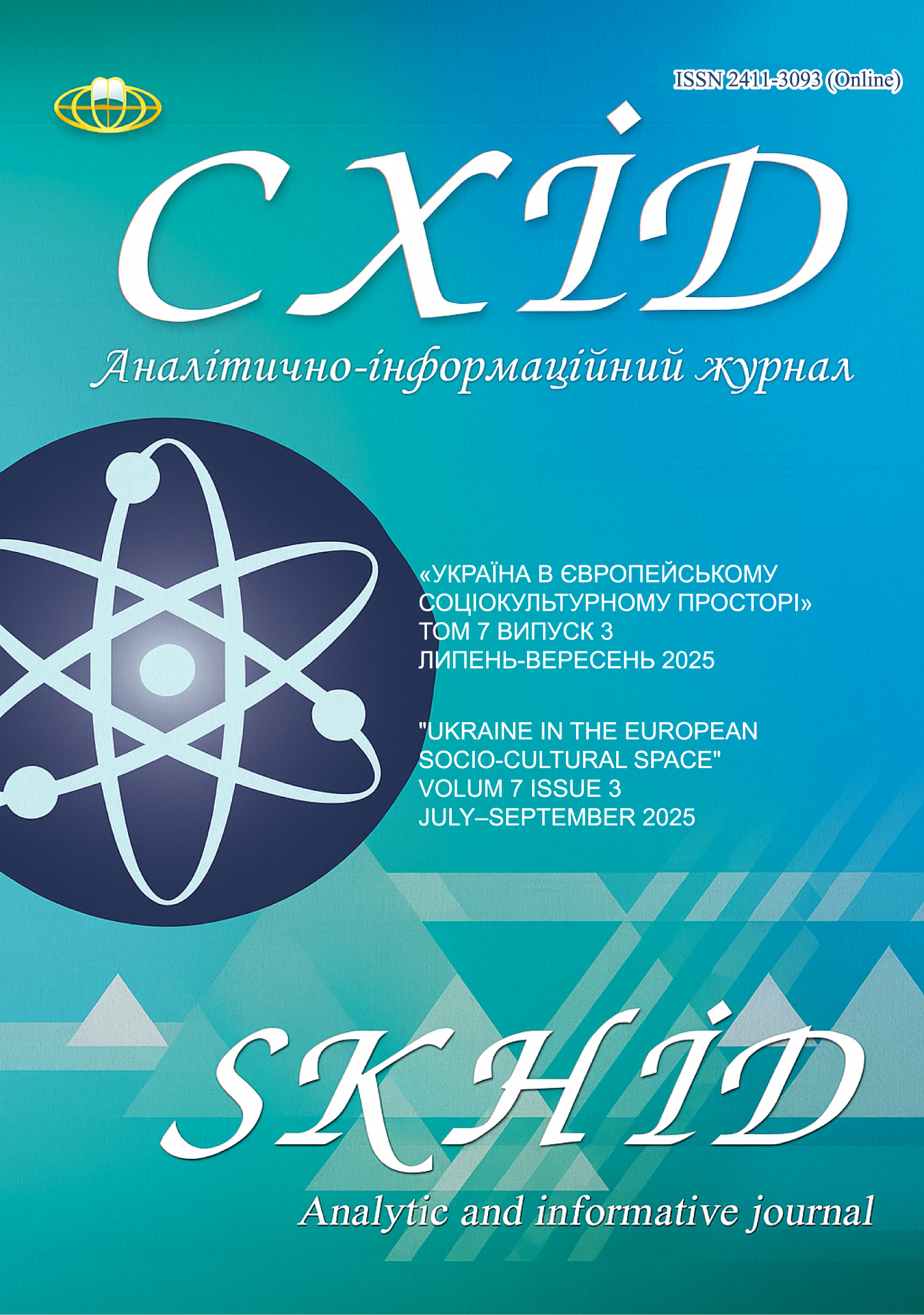Europe's “Shadow Agent”: Rethinking Ukraine's Historical Role in the 20th Century
DOI:
https://doi.org/10.21847/2411-3093.2025.7311Keywords:
Ukraine, Ukrainians, geopolitical subjectivity, “shadow agent of Europe”, pulsating subjectivity, European civilizationAbstract
The article is devoted to the problem of adequately understanding the role of Ukraine and the Ukrainian nation in European being. The authors focus not on economic, cultural, and scientific factors, which are also important, but on geopolitical and military-political factors. The article describes and analyzes the most important moments of active participation of Ukrainians in events that are extremely important for the whole of Europe. To this end, the authors use the concepts of active and latent geopolitical subjectivity, national subject, and actor. They introduce the concepts of “shadow agent” and “pulsating subjectivity” into scientific discourse for the theoretical understanding of the role of Ukraine and Ukrainians in the events of the 20th century. With their help, the authors seek to reveal as deeply as possible the essence of the “key moments” in European history to which Ukraine is directly involved. These include the destruction of the despotic Russian Empire in 1917, the halting of the Bolshevik invasion of Western Europe in 1920, and active participation – from September 1, 1939, to September 2, 1945 in combat operations against the totalitarian states of the Axis, the liquidation of the Gulag, and, ultimately, the dismantling of the USSR.
The article concludes that throughout the 20th century, Ukraine and Ukrainians repeatedly played one of the key roles on the “geopolitical chessboard,” either as an active player or as a shadow actor, and if they had not done so, Europe would now look much worse, and European civilization might even have dissolved into the Eurasian geopolitical swamp. However, the real role of Ukraine and Ukrainians was not always recorded, so it seemed that historically significant events took place, but without Ukraine. Therefore, the authors note: “bringing” Ukraine “out of the shadows,” showing the whole world, and above all Europe, its true historical value as an integral factor, and often even the savior of European civilization, is today one of the most pressing tasks of the Ukrainian intellectual elite, including scholars of Ukrainian studies.
Downloads
References
Berlin Blockade. (2025, July 15). In Wikipedia. Retrieved August 20, 2025, from https://en.wikipedia.org/wiki/Berlin_Blockade
Bondaruk, L. (2025, March 24). Ukraintsi v HULAHu [Ukrainians in the GULAG]. Localna istoriya. https://localhistory.org.ua/videos/bez-bromu/lesia-bondaruk/ (In Ukrainian)
Brekhunenko, V. (2022, September 7). Bytva pid Vidnem: za vse ta z kavovym hepiendom [The Battle of Vienna: For everything and with a coffee happyend]. Lokalna istoriia. https://localhistory.org.ua/texts/statti/bitva-za-vse-ta-z-kavovim-gepi-endom/ (In Ukrainian)
Cambridge University Press. (n.d.). Actor. In Cambridge dictionary. Retrieved August 20, 2025, from https://dictionary.cambridge.-org/uk/dictionary/english/actor
Hrabovska, I., Hrabovskyi, S., Dodonov, R., Kahamlyk, S., Marutian, R., Nastoiashcha, K., Turpak, N., & Chuprii, L. (2024). Heopolitychna subiektnist Ukrainy v konteksti hlobalnykh vyklykiv [Geopolitical subjectivity of Ukraine in the context of global challenges]. Kyiv, Milenium. https://ndiu.knu.ua/images/vydannia/Subjektnist_NDIU.pdf (In Ukrainian)
Hrabovskyi, S. (2015). Ukraintsi u Druhii svitovii viini: pro bezderzhavnu subiektnist ukrainskoi natsii [Ukrainians in the Second World War: On the state-less subjectivity of the Ukrainian nation]. Filosofska dumka, (4), 72–79. (In Ukrainian)
Kulchytskyi, O. (1995). Osnovy filosofii i filosofichnykh nauk [Fundamentals of philosophy and philosophical sciences] (In Ukrainian)
Lenin, V. I. (1918). Pis'mo G. K. Ordzhonikidze [Letter to G. K. Ordzhonikidze]. Leninism.SU. https://leninism.su/works/89-tom-50/318-pisma-mart-aprel-1918.html (In Russian)
Lenin, V. I. (1920, July 23). Telegramma I. V. Stalinu 23 iyulya 1920 goda [Telegram to I. V. Stalin on July 23, 1920]. Leninism.SU. https://leninism.su/works/99-v-i-lenin-neizvestnye-dokumenty-1891-1922/3656-dokumenty-1920-g-iyul.html
Losiev, I. (2011, July 7). Estonskyi Davyd proty rosiiskoho Holiafa [Estonian David versus Russian Goliath]. Ukrainskyi tyzhden. https://tyzhden.ua/estonskyj-davyd-proty-rosijskoho-holiafa/ (In Ukrainian)
Mishalova, O. (2020). Kliuchovyi diievets istorii [The key actor of history]. Актуальні проблеми духовності (Actual problems of mind), (21), 159–203. https://doi.org/10.31812/apd.v0i21.3877 (In Ukraini-an)
Nota Bene. (2023). Suchasnist the last. Ivan Dziuba ta yoho doba [Modernity the last. Ivan Dziuba and his era]. Milenium.
Subjectivity. (2025, June 2). In Wikipedia. Retrieved August 20, 2025, from https://en.wikipedia.org/wiki/Subjectivity
Teror golodom [Terror by famine]. (2025, September 19). In Wikipedia. Retrieved October 20, 2025, from https://uk.wikipedia.org/wiki/%D0%A2%D0%B5%D1%80%D0%BE%D1%80_%D0%B3%D0%BE%D0%BB%D0%BE%D0%B4%D0%BE%D0%BC
Trotsky, L. (1939a). Demokraticheskiye krepostniki i nezavisimost' Ukrainy [Democratic serf-owners and the independence of Ukraine]. Marxists Internet Ar-chive. https://www.marxists.org/russkij/trotsky/works/trotm478.html (In Russian)
Trotsky, L. (1939b). Ob ukrainskom voprose [On the Ukrainian question]. Marxists Internet Archive. https://www.marxists.org/russkij/-trotsky/works/trotm465.html (In Russian)
Yuzych, Yu. (2019, August 20). Ukrainskyi parad u stolytsi Rosii [Ukrainian parade in the capital of Russia]. Istorychna pravda. https://www.istpravda.com.ua/articles/2019/08/20/156103/ (In Ukrainian)
Downloads
Published
How to Cite
Issue
Section
License
Copyright (c) 2025 Сергій Грабовський, Ірина Грабовська

This work is licensed under a Creative Commons Attribution-NonCommercial-NoDerivatives 4.0 International License.
1. Authors bear responsibility for the accuracy of facts, quotations, numbers and names used.
2. Manuscripts are not sent back.
3. The publisher does not always agree with the authors' opinion.
4. The authors reserve the right to authorship of the work and pass the first publication right of this work to the journal under the terms of a Creative Commons Attribution-NonCommercial-NoDerivatives 4.0 International License. This license allows others to distribute (copy) the published work for non-commercial purposes, provided there is mandatory attribution to its authors and a link to the first publication in our journal.
5. The authors have the right to conclude separate supplement agreements that relate to non-exclusive work distribution in the form in which it has been published by the journal (for example, to upload the work to the online storage of the journal or publish it as part of a monograph), provided that the reference to the first publication of the work in this journal is included.

